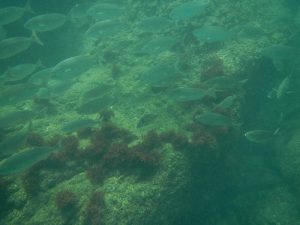Will economic interests such as commercial fishing and coastal development take priority over marine conservation?
“A sustainable fishing industry is dependent upon a healthy environment, as too are other economically important activities such as recreational fishing, boating and diving – all part of the South West’s tourism offer.”
.
A fortnight ago, Greenpeace wrote to ministers urging for greater ‘ambition’:
The Government has demonstrated bold ocean protection leadership with its Blue Belt of marine reserves around some of the British Overseas Territories, for example the recent creation of a 687,000 sq km ‘no take’ Marine Protected Area (MPA) around Tristan da Cunha. Now is the time to extend the same ambition to UK waters, as part of delivering a green Brexit and making good on the Government’s commitments to improve the livelihoods of coastal communities.
We urge the Government to step up its ambition significantly, by excluding the most destructive fishing vessels – beginning with all supertrawlers and bottom trawlers (including dredgers & other bottom towed gear) – from UK MPAs, from 1st January 2021. This would be a major step towards achieving the UK’s aim of properly protecting 30% of our oceans by 2030.
Open letter: strengthening UK ocean protection | Greenpeace UK
.
Earlier, the Guardian had followed Greenpeace dropping boulders in the Dogger Bank to try and impede bottom trawling or dredging the seabed:
… vessels, from the UK, other EU countries and Russia, spent an estimated 200,000 hours trawling or dredging across the seabed in offshore MPAs in 2019…
The Blue Marine Foundation wrote to the fisheries minister, Victoria Prentis, to say it would seek a judicial review unless the government commits to protecting Dogger Bank and other MPAs. A number of NGOs, including WWF and the Marine Conservation Society, also accused the UK, the Netherlands and Germany of breaching the EU habitats directive by failing to protect Dogger Bank from bottom-impact fishing.
There are indications that the government is under pressure to restrict fishing in protected marine sites, although it has to balance the promises it has made to UK fishermen and allow some access to EU boats. Last week, Zac Goldsmith described supertrawlers as “gigantic tools of destruction” and hinted at a ban on industrial fishing inside protected areas.
In response to Oceana’s analysis, a Defra spokesperson said: “We are putting sustainable fishing and the protection of our seas at the heart of our future fishing strategy. We have already set up a ‘blue belt’ of protected waters nearly twice the size of England and the fisheries bill proposes new powers to better manage and control our marine protected areas.”
Leaving the EU and “taking back control of our waters” means the government can introduce stronger measures, they said.
Revealed: 97% of UK marine protected areas subject to bottom-trawling | Environment | The Guardian
.
The UK government has made substantial commitments with the setting up of a new body:
In order to support the Government’s ambition to protect and restore clean healthy, productive and biologically diverse marine ecosystems, the Marine Management Organisation (MMO) undertakes a range of marine conservation activities.
.
 Certainly, EU protected areas are faring badly:
Certainly, EU protected areas are faring badly:
And so have those around the UK, which has brought about the recent lobbying of government:
UK Marine Protected Areas will continue to be Trashed post-Brexit claim
This lobbying will certainly continue from all quarters:
Brexit and our seas | Marine Conservation Society
.
To finish, Dr Abigail McQuatters-Gollop, Associate Professor of Marine Conservation at the University of Plymouth gives an opinion on protecting marine biodiversity in post-Brexit Britain:
Sitting behind this legislation is body of scientific research. What many people might not know is that the UK has played a leading role in a number of marine management organisations, including the International Council for the Exploration of the Sea and the Convention for the Protection of the Marine Environment of the North-East Atlantic (OSPAR) – and these have greatly influenced the European science-policy landscape. In stark contrast to the stereotype of ‘Brussels says this and Brussels says that’, the EU listens to and works with scientists to ensure that its policies are ecologically meaningful.
Now, of course, we are outside of the EU and it is unclear as to how the UK intends to manage its marine environment. Without the framework of the EU’s Marine Strategy Framework Directive (MSFD), will we see a shift from proactive management of biodiversity with clear environmental targets, to a more reactive, even disaster-based method? And without access to funding streams such as Horizon 2020, what is the future for the kind of intensive research that we have been conducting so successfully? Will economic interests such as commercial fishing and coastal development take priority over marine conservation?
Whatever the answers – and the government’s 25-year Environment Plan did not reveal many – it would be unwise to disaggregate fishing and environmental management and conservation. A sustainable fishing industry is dependent upon a healthy environment, as too are other economically important activities such as recreational fishing, boating and diving – all part of the South West’s tourism offer. We need greater coordination and better integration between all stakeholders, scientists and government if we are to benefit from greater flexibility and speed in decision-making that Brexit, in theory, might deliver.
Opinion – Protecting marine biodiversity in post-Brexit Britain – University of Plymouth
The University of Plymouth is very influential in areas relating to the coast, many of their studies are funded by Government Departments and the outcomes of these inform Government Policy
University research informs the government’s ambitious plan for conservation
The Marine Climate Change Impacts Partnership (MCCIP) is a partnership between scientists, government, its agencies, non-governmental organisations (NGOs) and industry. Plymouth University News.
.
photo: File: Berlengas (Marine Protected Area ).jpg – Wikimedia Commons